Signs along the road, part 2: 1960-1979
In Part 1, we noted that the Lord has promised “signs” along the road of life to bless us and to assure us that we are on the path leading back to Him. I related several personal experiences between 1949 and 1959 which were evidence to me of His power and love. Part two will highlight selected additional events over the ensuing twenty years.
Lost without my missionary companion
I arrived in Montevideo, Uruguay, to begin my mission the day before Thanksgiving in 1960. The mission president assigned me to labor with Elder Dewey Zufelt in one of the branches in the center of the city. Montevideo had over a million people, far more than a farm boy from Rupert, Idaho, had seen in one place before. It had a confusing network of streets rather than the simple north-south and east-west orientation I was familiar with.
On my first or second day with Elder Zufelt, I managed to get separated from him in a distant corner of Montevideo. Elder Zufelt had climbed onto a crowded bus, hoping there would be room for me too. But there was no extra space for me even to step onto the rear platform or hold onto the hand rail, so I was left behind as the bus pulled away. My companion tried to motion to me that he’d get off at the next stop. But I thought he was telling me to get on the next bus and follow him!
Both buses eventually appeared to be reaching the end of the line, and it was clear that Elder Zufelt wasn’t on the first bus. I realized I would somehow have to find my way back to our apartment on my own. I had the address, but not the phone number, nor the phone number of the mission office. Nor did I have money for a taxi. But thanks, I’m sure, to Divine Providence, I was able to find a bookstore nearby. Knowing a fair amount of Spanish already from my stake missionary experience, I was able to buy a map of the city, board the necessary buses, and walk the remaining distance back to the apartment, where a distraught senior companion had announced to the other elders that he’d lost his companion. He was likely almost as relieved as I when I walked through the front door. No angels were seen, no voices were heard, and to others the event may seem nothing worth writing home about. But the relief I felt upon finally being reunited with my companion, and the “coincidence” of having found a bookstore on the outskirts of town, right when I needed one, was as great as if a sea had been parted on my behalf.
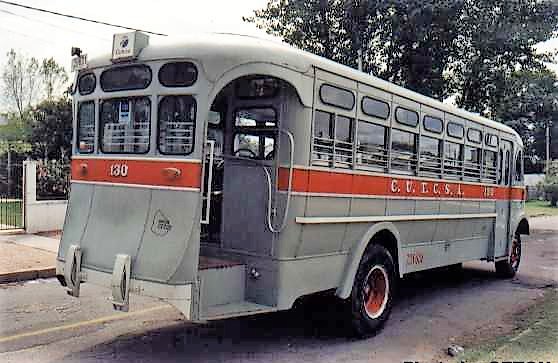

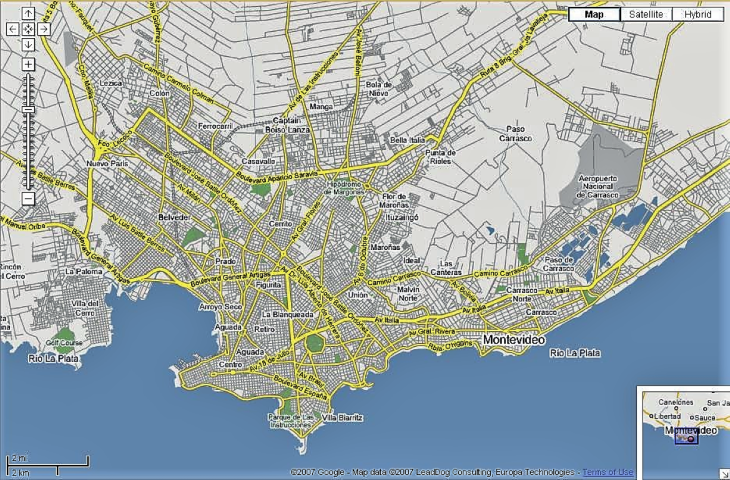
Recurring dream

During the next two and a half years I was blessed repeatedly with the same unusual dream. The scriptures attest that God sometimes communicates through dreams. This seemed to me to be such a case. The dream was always brief. Each time I simply dreamed that I had finished my mission, having accomplished no more than I had accomplished in real life up to that point. It was always a relief to wake up and I always felt motivated to try to do better!
Experiences with A. Theodore Tuttle and Hugh B. Brown
After a fairly normal mission for the first eighteen months, with various companions in various cities, I was asked to serve as an office assistant to Elder A. Theodore Tuttle, of the Seventy. Elder Tuttle had just arrived in Uruguay to preside over all of the South American missions, much as an area president would today. Another Portuguese-speaking elder was brought down from one of the Brazilian missions to be my companion. Together we were to coordinate translation of manuals, films, and other materials for the South American missions. I was also to handle the financial records for the South American Mission office, transcribe letters for President Tuttle, serve as an interpreter as needed, teach Spanish classes to President Tuttle, and assist in other ways as circumstances required. We were expected to proselyte in our spare time, which we didn’t find as often as we would have hoped. I anticipated that after a few months in the office I would be rotated back into the field, but it never happened. I spent the last thirteen months of my mission in the same exciting assignment.
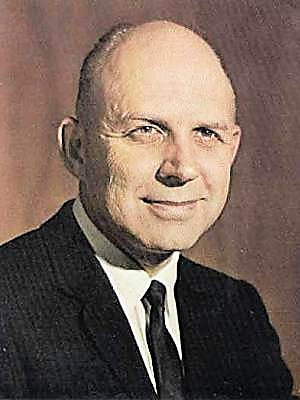
During this time, I was also called to serve as branch president of the local Carrasco Branch, serving the Tuttle family, the family of the mission president, J. Thomas Fyans, other North American families who had been sent to oversee Church construction and other temporal matters throughout South America, and a handful of newly converted Uruguayan members.
These were days never to be forgotten for many reasons. But as the theme of this article is observed instances of the divine hand, let me mention four, which stand out in my memory from this year of my mission:
First, was the timeliness of my call to work with Elder Tuttle in paving the way for my career in the Church Educational System. Elder Tuttle had been one of the administrators of that program prior to his call as a general authority. In an earlier routine interview he had conducted with me, I had mentioned my goal of working as a seminary and institute teacher. He took some time during the interview to offer counsel and encouragement. He may or may not have remembered that interview when he later invited me to work in his office. In any case, my months of rubbing shoulders with Elder Tuttle, observing his example, and receiving his counsel, were most helpful during the forty years which followed. And Elder Tuttle’s graciously pulling a few strings probably made all the difference in my being hired in the first place. Rather than have to go through the normal application process, hoping to be invited to do some student teaching in a seminary, and hoping to sufficiently impress those who came to observe me, I was basically hired sight unseen once I returned from my mission, upon Elder Tuttle’s recommendation, pending my completing my bachelor’s degree at BYU. To me, this was nothing short of miraculous.
Secondly, my companions and I saw the hand of the Lord in helping us accomplish as much as we did in the office, particularly in coming up with a way to prepare Spanish sound tracks to accompany several of the instructional movies the Church had produced in English. With the technology available in today’s digital world, it would have been infinitely easier. But with our limited equipment and the primitive technology available to us, it appeared the only option we had would be to prepare a Spanish audio recording to be played on a tape recorder as the English movie played with the sound turned off. We proceeded to produce translations, recruit and record native speakers for the various parts. We were elated to finally have a finished product in hand, just before it was needed.


But we were then horrified to discover that the recorder didn’t always play the recording at the same speed as the projector played the movie! Evidently, it depended on the quality and reliability of the power source, which affected the two pieces of equipment in different ways. We initially had no idea how to solve the problem. But then the idea came to us to take out the moments of silence from the recording and provide the presenter with a script indicating at what points he simply needed to push “pause” on the recorder, and at what point he needed to push “play” again, to keep the audio reasonably synchronized with the video. It all seems so primitive now, but it worked! We were grateful for the idea, which provided a solution to a problem we were unable to solve on our own.
Third, I was impressed with how the Lord inspired my first counselor in the branch presidency, a new convert named Jose Labuonora, to understand how to lead and to administer Church programs properly. We had absolutely no handbook of instruction in Spanish in those days. I gave what counsel and instruction I could to Brother Labuonora and to other new members of the branch, with the limited understanding I had myself. But I constantly saw the members (and especially Brother Labuonora) intuitively understand how things should be done, even when no formal instruction on the subject had been available. When it was time for me to be released, I felt Brother Labuonora was fully ready to be called (as he was) to succeed me as the first Uruguayan president of the Carrasco Branch.
Finally, I must mention the 1963 visit of President Hugh B. Brown of the First Presidency as part of his tour of all the South American missions. I recorded at the time the following feelings concerning his talk to the missionaries:
“Never have I felt so much of the Spirit and been so profoundly affected by a talk. My eyes were wet most of the time. He spoke for somewhere from an hour to an hour and a half, and it flew by like only a few minutes. The Spirit seemed so thick one could cut it with a knife. The spirit of prophecy and revelation was surely present, and no doubt was left in anyone’s mind that we had heard in very deed a living prophet of the Most High God. May I never forget the experience of that day!”
While I have forgotten many of the specifics of his words, I can never forget the feelings. I do remember his pausing as he looked out at the group of missionaries and said, “I wish I could tell you what I see.” We never knew precisely what he was referring to. But significantly, several general authorities, area seventies, and stake and mission presidents were later called from that group.
As my companion and I were living in the Tuttle home at the time, we were invited to kneel with the Tuttles and President Brown in family prayer, which President Brown was invited to offer. That was quite an experience itself, to hear a member of the First Presidency talk with the Lord. Afterwards, perhaps sensing our reaction, he simply commented, “You should hear President McKay pray!”
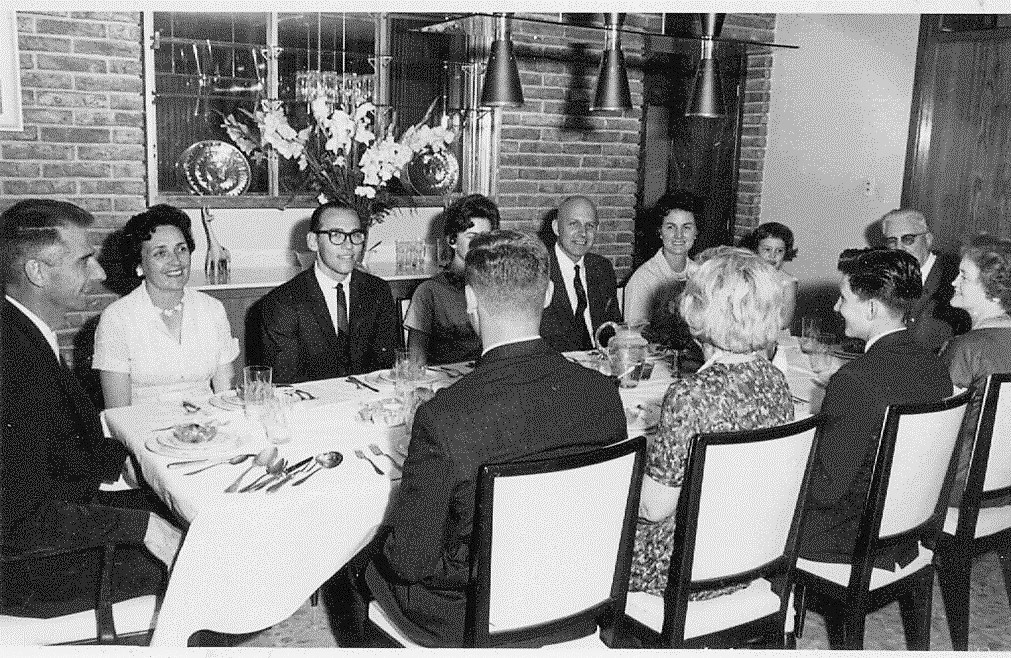

Windows of heaven opened
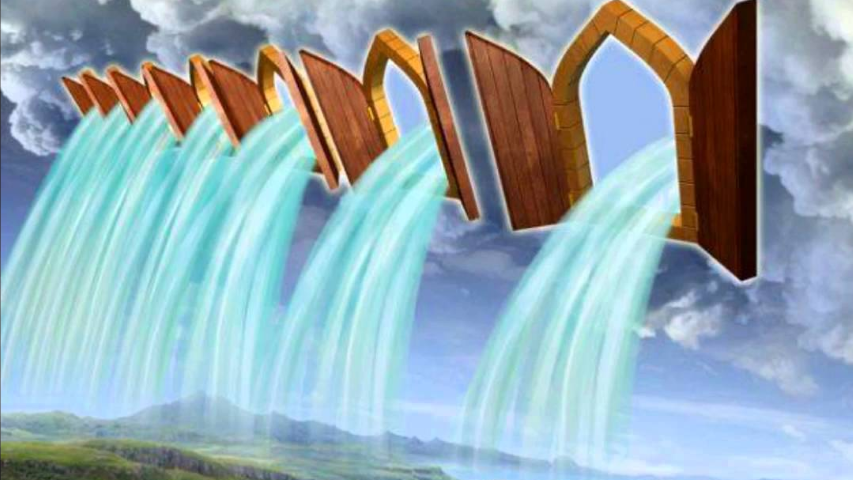

After returning home from my mission in June, 1963, I promptly asked Virginia to marry me and return to BYU with me that fall. I looked for whatever summer employment I could find in or around my hometown of Rupert, Idaho. The only thing available was a job hauling hay for long hours each day. After a few weeks the job ended, partly because the hay was hauled and partly because my employer had run out of money with which to pay me.
By winter, we were happily married and living in a small trailer in Provo, a couple of miles from campus. I was going to school and working part time. Virginia was also working on campus and was expecting our first child. We had an old yellow and black Rambler on which we relied for transportation. But one day the car was in the garage for repairs and would cost us $40 to get it out. We had just barely $40, but we owed $40 in tithing. We had a decision to make. Wouldn’t the Lord understand that Virginia couldn’t easily walk to and from work in the snow in her condition? Wouldn’t He take an IOU on the tithing? But we had always been taught that if we put the Lord first, He would take care of us. He would “open the windows of heaven,” as Malachi put it. We decided to pay the tithing.
The very next day I received a check in the mail from my summer employer for exactly $40 toward what he still owed me. He had known nothing about our car situation. But the Lord did. I never heard from the ex-employer again. But I have never experienced a more dramatic or immediate opening of the heavens in response to the payment of tithing.
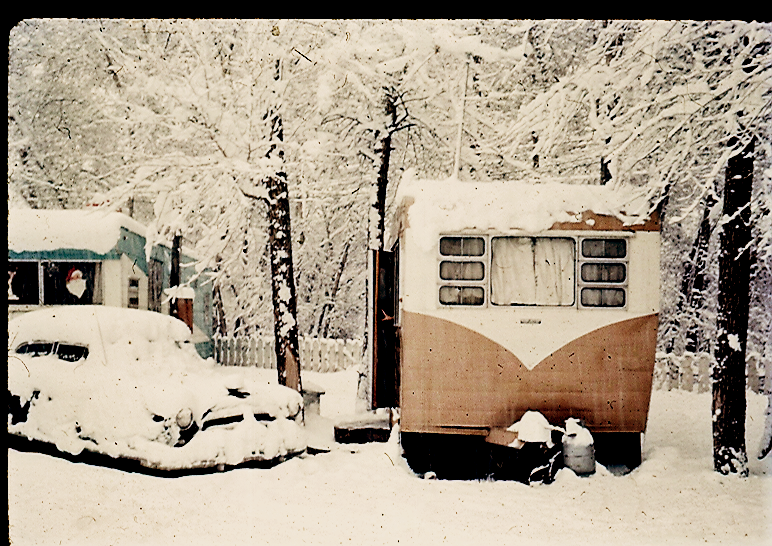
Only one good day of student teaching in seminary
As previously mentioned, Elder A. Theodore Tuttle, a former administrator of seminaries and institutes of religion, was good enough to write a sufficiently persuasive letter of recommendation on my behalf to the then current administrators that I was offered full-time employment as an institute teacher, sight unseen, contingent simply upon my completing my bachelor’s degree and obtaining my teaching credentials. That would include doing some student teaching in a local seminary as well as in a nearby high school.
The seminary teaching was presumably something of a formality. I had already been offered employment with the Church Educational System, starting with teaching half time in the College of Religion at BYU while I worked on a master’s degree. Still, I wanted to do a good job in the student teaching. I wanted to demonstrate that their confidence was not misplaced. If I did poorly enough, I assume they could have found a way to rescind the offer. But while I felt reasonably successful in my student teaching in the high school, I struggled in seminary. Nothing seemed to work well. I’m sure the students were almost as frustrated as I was. Fortunately, no one came out to observe my teaching during those first trying days and weeks.

 Then, one day, I noticed Leland Andersen slip into my class just before it was to start. He was the one from the central office in charge of teacher training and evaluation of prospective new teachers. I definitely felt on the spot to perform.
Then, one day, I noticed Leland Andersen slip into my class just before it was to start. He was the one from the central office in charge of teacher training and evaluation of prospective new teachers. I definitely felt on the spot to perform.
I had a typical lesson prepared, but suddenly felt impressed to leave the lesson plan behind. Ideas came to me for an interactive lesson on the various witnesses to Jesus’ resurrection, somewhat in a courtroom format. I felt freed from the structure I had planned for the day. Students participated well, and I was able to inject both spontaneity and enthusiasm into the teaching. For the first time I felt we had had a good class. Brother Andersen also seemed to feel it had gone well. Either he was so impressed that he never felt the need to come out for a second visit, or he knew that I had already been offered a contract and felt there was nothing he could do about it. We never had another day which went so well in all the time I student taught. I will be forever grateful that a loving Father in Heaven stepped in and helped me rise to a level I had never achieved on my own, on the one day during my student teaching when it really counted.
A genealogical needle in a haystack

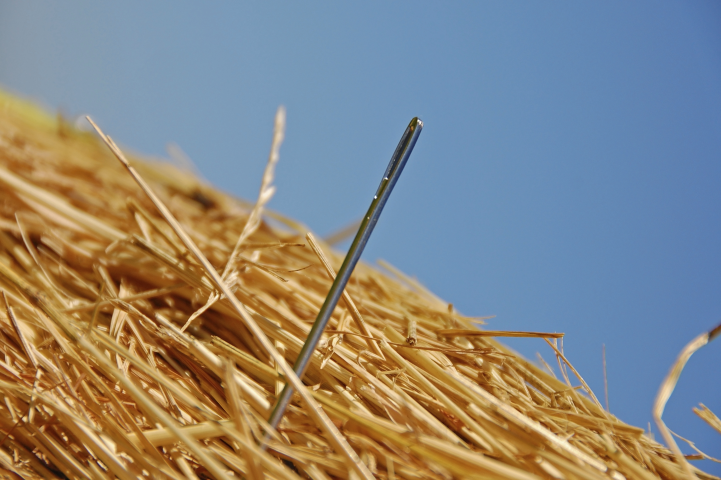
While a student at BYU, I went one day to the Church’s genealogical library in Salt Lake City. I knew virtually nothing about family history, the library, what to look for, or how to look for it. Almost at random I pulled a microfilm from a filing drawer with records from the general location and time period of my Hunt ancestors, who lived in the late 1700’s in Enstone, Oxfordshire, England. Looking at it on the reader, I miraculously and almost immediately found a probate record for my ancestor, Robert Hunt. It listed several children of whom I had previously been unaware and for whom temple work could be done. I felt the Lord was trying to encourage a family history novice by giving him far more success than he deserved with far less effort than would normally have been necessary.
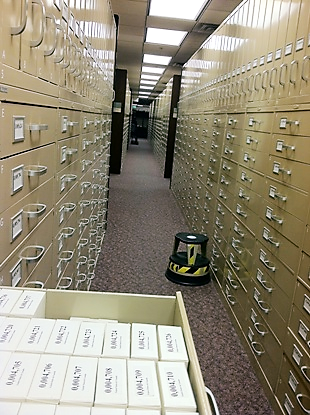

Running over our second daughter–twice
Our second daughter, Susan, worked her guardian angels overtime in her early years. As an infant, she fell out of her baby seat from the top of a student’s desk onto the floor at BYU. She later fell head first over the edge of a five-foot-high set of stairs leading into our basement apartment in Provo. She twice rode her wheeled toy horse down a long flight of stairs at our apartment in Hayward, California. She put a key into an electrical outlet. She drank 3 in 1 oil. She nearly drowned in a ditch in Provo. Two days before entering the Missionary Training Center, she survived a head-on auto accident. But none of her close calls was more dramatic than one which happened when she was fifteen months old, just after we had moved into a new apartment in Hayward.
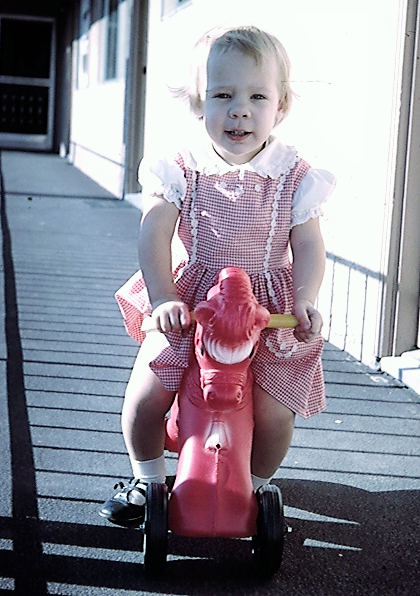

I’ll quote from Virginia’s account: “Monday morning Don drove our car (a Rambler station wagon) to a shop to have the brakes worked on and then he walked home. In the afternoon the auto shop attendant delivered our car. Don was downstairs in the parking lot playing with Ginette and Susan at the time the car was delivered. The auto shop attendant left the car in the parking lot but did not put it into a parking stall. So, when the attendant left, Don proceeded to park the car in a stall. He assumed that Susan was with a group of children playing near the apartment building. As he backed up the car he could tell he had run over something, which he assumed was a curb, so he proceeded to pull forward again. Then he said he had a terrible feeling that it was not a curb. He got out of the car and went around to the back of the car and found Susan lying there with a tire track across her body where the car had passed not just once but twice diagonally across her body from her right shoulder to her left leg and then down her left leg. The tire of the car had just barely missed her head.
“Don picked up Susan and brought her upstairs to me. I could tell the minute I saw his face that something was very wrong because he was white as a sheet. We already had with us the name and address of a Dr. H. C. Crockett, an LDS doctor in Hayward, so we went immediately to his office. As Don drove I was holding Susan in my arms and we were praying the entire way to the doctor’s office. As soon as we arrived, Don took Susan in and I stayed in the car with the other two girls. Don gave Susan a blessing while he waited for the doctor to enter the room. After the doctor examined Susan carefully he turned to Don and said, ‘You are in worse shape than she is.’ She had no broken bones and no internal injuries, though the skin was scraped off her back and her leg by the car tires. The doctor bandaged her up and we took her home to care for her. She was unable to walk for a few days, and for a year afterwards would scream every time a car backed up near her. But as far as we can tell she received no permanent scars, either physical or emotional as a result of this traumatic experience.”
I was extremely grateful that the Lord was watching over Susan, even when I was not.
Should I pick cherries or study?

In our early years of marriage and employment with the Church Educational System, we returned to BYU virtually every summer to continue work on my master’s degree. In either 1968 or 1970, while there, I was asked somewhat last minute by the ward we were attending to help pick cherries the next day at the stake welfare farm. I was to have a major exam the following day in one of my classes, for which I felt woefully unprepared. But remembering our earlier experience with paying tithing when we really couldn’t afford it, I responded to the call. I told myself that in any case I was so unprepared that if I spent the entire day studying, I’d still have little chance of passing the exam. But astonishingly, it turned out that the exam asked only questions about the very few things I had actually studied, and I came away with a very satisfactory grade and a new reminder of the blessings which come when we put the Lord first.
Blessings associated with driving old cars
In the days when we could afford only old cars, we experienced several mini-miracles. In the summer of 1969 we drove from California to Idaho to see our families and continued on to Yellowstone National Park. As we drove home, we noticed the brakes getting progressively worse. But they kept doing the minimum necessary until we got right in front of our apartment, when they totally failed!
On another occasion, we drove our little red Rambler station wagon on an extended trip, including on mountain roads, oblivious to any mechanical problems. But as we returned to our home in Newark, California, the right front wheel fell off completely at a stop sign, just blocks from our home!
One morning in late 1971 it was clear that our car’s battery was on its last legs. I had somehow managed to get the car started that morning, but it was clear that I couldn’t depend on its starting again unless I got a new battery. It appeared I might barely have time to stop by the Grand Auto store on my way to my 11:00 a.m. institute class. If I could get waited on quickly, I might make it to class on time. But at an intersection on my way to the store, the car engine died. It was not going to start again without help. It looked like I would have to miss teaching my class that day. But a ward member just happened to be directly behind me and was more than happy to push me to get the car started again. I was able to get waited on quickly at Grand Auto. They installed the new battery just in time for me to make it to class.
In December,1973, Virginia was driving our Volkswagon van early in the morning uphill in the mountains near Tahoe, with the sun in her eyes and the rest of us asleep. I suddenly awakened just in time to say, “You see that truck, don’t you?” She had not! With the sun in her eyes, she didn’t notice that she was about to rear end a big truck, which was trudging up the hill at only about five miles per hour.
In June, 1974, we were driving from California to Provo for summer school with a new baby. To make the trip more comfortable for everyone, we had bought an old copper colored bread truck, which had been converted into a camper. It was fun to ride in but was so old and worn out that one mechanic told me we had no right to be driving around the country in something like that!
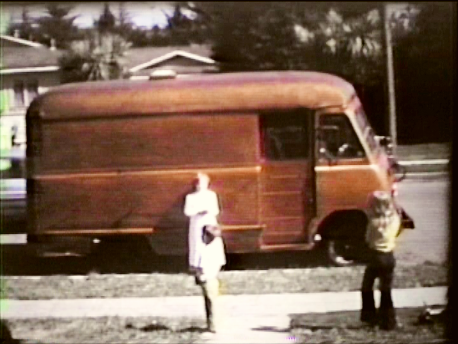

The trip started uneventfully, but we noticed as we got near Winnemucca, Nevada, that the battery wasn’t charging and that our lights were getting quite dim. As we pulled into a rest area for the night, we were glad there were other travelers around who could help us get started in the morning. Sure enough, we had to ask someone to jump our battery the next day. But we got to Winnemucca without further difficulties.
In Winnemucca we looked for someone who could work on the generator, but we couldn’t find anyone who could get to it before about 11:00 a.m. It was then only 8:00. We hated to just sit around that long and wondered if we could make it to the next town and have better luck. We noticed that the horn was working now, which it hadn’t been earlier. We surmised that maybe the generator was working enough to charge the battery slightly when the headlights weren’t on, even though it had run down the night before. We decided we’d keep driving at least until the horn started getting weaker again. We felt that if we could get to Burley, Idaho, and leave Virginia and the kids off at her parents’ place, I could have the generator fixed or replaced without the family having to be cooped up in the car.
Anyway, things went fine until we came upon a bit of road construction about 12 miles west of Elko. We had to stop behind a line of cars going uphill, since there was room for only one line of cars at a time to pass the construction. When we tried to accelerate to follow our line of cars up the hill, our car stalled, and the battery was too weak to start it. We had to motion to the other vehicles to come around us. When the coast was clear we tried to coast backward down the hill and start the car that way, but it didn’t work. But miraculously we were able to find a mechanic at the construction site who was willing to tow us off the road and give us a hand in getting going again. He assured us that just jumping the battery wouldn’t help if the battery was totally depleted by a faulty generator, so he charged our battery with a charging apparatus he had on his truck and assured us we should be able to get to Elko. (What were the chances of our breaking down right next to the only person on the road who could charge our battery for us?)
We then discovered a second problem—the fuel pump wasn’t working properly. We couldn’t start the car even with the charged battery without pouring gas down the carburetor several times. We finally got to Elko and decided we’d learned our lesson about postponing needed repairs. But we found the mechanics in Elko were even busier than those in Winnemucca. After stalling a time or two and being helped a time or two again at service stations, we finally pulled into a station where they thought they could get to us late that afternoon. While we waited for them, I walked all over town trying to find someone who could help us sooner, but most said were tied up completely for anywhere from one to three days. As the afternoon wore on, it looked more and more like even the station we were parked at wouldn’t be able to get to us that day, and we’d be doomed to wait there overnight.
Then, at the far eastern end of Elko, I came to a big Penney’s store, complete with an automotive center. I didn’t hold out much hope that they could help us either but thought it wouldn’t hurt to ask. Lo and behold, they did have a generator, but didn’t know if they’d have time to put it on for us. They said to call back in 15 minutes, when the mechanic would be back and could let us know. When I called back, they said they could take us right then. As it turned out, they were willing to tow us down to their store for free and replaced both the generator and fuel pump for us, working an hour overtime to do so, and charged us only $68 for everything. The total labor was only $18, for about 2 ½ or 3 hours of work. Everyone there seemed so anxious to help. It was a real contrast to the attitude we had found every place else. For a while it looked like they might not be able to find a fuel pump for us. The first report they got from the Ford dealer was that nobody made fuel pumps for that engine anymore. Happily, this turned out to be an error. Finally, they located a pump that would work, with a few modifications, and we got away about 6:00 p.m. Penney’s surely earned our undying gratitude.
On another occasion driving from Utah to Idaho, we developed radiator problems in the same camper truck. But with the help of some epoxy glue, masking tape, water from our camper storage tank, and no doubt a couple of guardian angels, we made it safely to our destination.
Locked out of my office
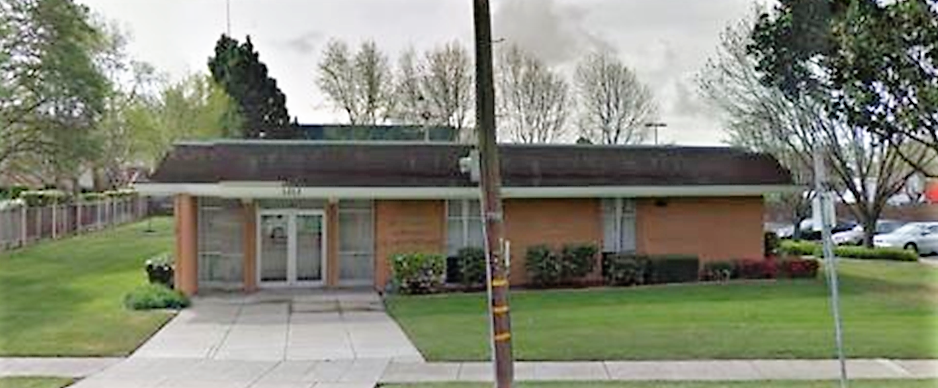

Hayward Institute of Religion
One evening in December,1970, I took my four young daughters (ages 6, 4, 3, and 2) to the Hayward Institute of Religion with me. Somehow, I managed to get locked outside of both my office and the secretary’s office, with my keys (including car keys) inside. The only phones were also inside the offices.
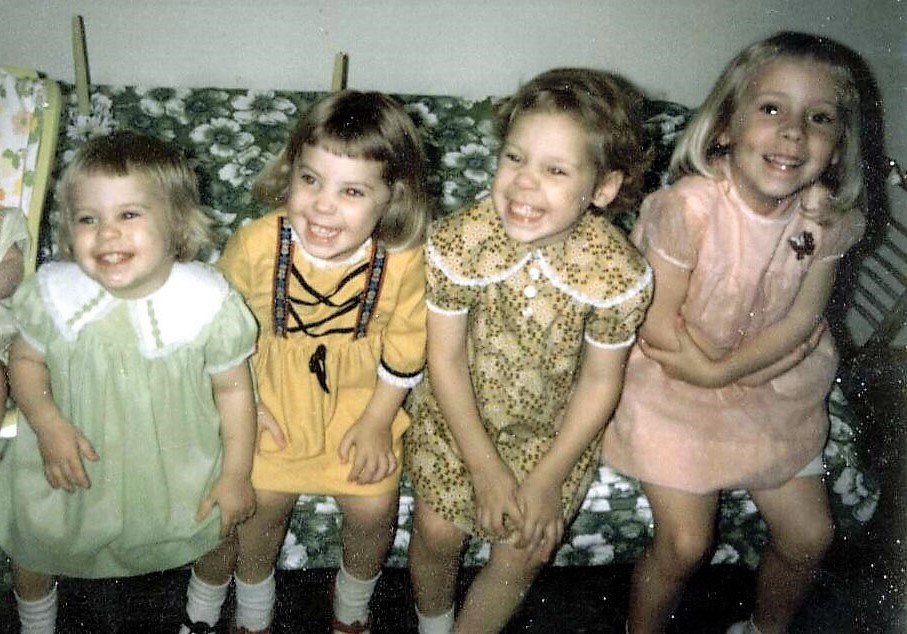

Without my knowing it, the girls retired to a corner of the building and prayed that somehow I’d be able to get into the offices. Almost immediately after their prayer it occurred to me that perhaps I could pry the sliding glass windows apart in the secretary’s office, without breaking them, and open the door. It worked. I still didn’t have access to my keys, which were inside my adjoining locked office. But I was able to call Virginia and have her come in another car and take us home. My secretary was able to open my own office for me the next day to retrieve the keys. I was grateful not only to be able to get home that evening but for my daughters to have had such a clear answer to their prayer.
Nearly losing our first-born son
In April and May, 1971, our one year old son, David, narrowly survived a near fatal bout with staph pneumonia. He, like his siblings, had just had the chicken pox. But David continued very sick afterwards. Our doctor initially tried to assure us that his fever and other symptoms were just residual effects of the chicken pox. Upon Virginia’s insistence that it had to be something more, the doctor finally prescribed penicillin and told us David would start getting better within twenty-four hours. He did not, but continued to get worse. I gave David a blessing, but we recognized the need to couple appropriate works with our faith, so we persisted in calling the doctor’s office until he finally agreed to see David again.
After we waited a couple of hours in the doctor’s office, he was finally able to see us. They took x-rays and discovered that one of David’s lungs was completely collapsed and the other was mostly filled with liquid. Dr. Crockett said he hadn’t realized David was in such serious condition. He sent us to the hospital and called in a specialist, a Dr. James Miller on staff at the Stanford Medical School.
Virginia wrote: “When the nurse took David’s temperature at the hospital it was 106 degrees. They took David’s clothes off and began to try to get his temperature down using ice packs. Two thoracic surgeons were called from Oakland. They inserted tubes into David’s chest to try to drain the fluid from his lungs. David was so sick that he just lay there and seemingly didn’t even recognize us. They tied restraints to his wrists so he wouldn’t pull his tubes out, but he was too sick to have done so. Don and I finally went home. It was Susan’s 5th birthday, but we didn’t do much celebrating.
“Late that night the doctor called to tell us there was bad news. He said that David’s pneumonia was staph pneumonia, which a few years earlier was fatal in every case. He said they had just developed staphicillin, which sometimes worked and sometimes did not. He said that sometimes the pneumonia just seemed to stay ahead of the treatment and that he couldn’t assure us that David would make it. We started to fast each day for David—fasting breakfast and lunch each day and then eating dinner in the evening. Sisters in Newark Ward took care of our four girls so I could stay with David in the hospital every day. For two weeks the doctors still weren’t sure if David would recover. After two weeks the thoracic surgeons finally opened up David’s chest to try to remove the fluid in his lungs, because the three tubes kept clogging. While he was in the hospital David had over 100 x-rays and over 100 shots of antibiotics. Finally, after more than three weeks in the hospital, David was considerably recovered and able to return home. Dr. Miller was on staff at Stanford Medical Center and was the doctor who developed staphicillin. Since then many antibiotics have been developed which are very effective in treating staph. Dr. Miller told us later that David was within 24 hours of dying at the time he was finally hospitalized.”
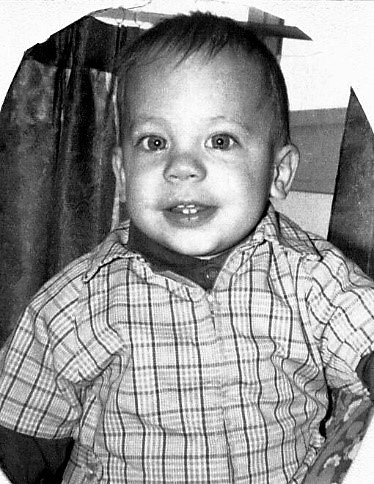

Spiritual experiences associated with this included:
- David’s being able to be treated by the very doctor who had developed staphicillin and who probably knew more about staph pneumonia than anyone else in the country.
- David’s beginning to recover once Virginia and I had reached the point that we were willing to tell the Lord “Thy will be done,” and accept the possibility, as Abraham, had to, of losing his only son.
- Our gaining an increased testimony of the power of fasting, prayer, and priesthood blessings over the course of two to three weeks.
- Our having a special prayer in David’s hospital room after a couple of weeks of his not giving any evidence of even recognizing us. As we finished the prayer, we looked over at him and saw him for the first time waving weakly at us, with a faint smile on his face. We finally felt assured that all was going to be well.
Prompted to check on a desperate daughter
In June 1971 Virginia wrote: “Carina [our third daughter, then nearly four years old] was crying just a moment ago, so I went to see what was the matter. She had a heavy string wrapped tightly around her neck about three times and got it tangled so that she couldn’t get it undone. She could still breathe enough to cry but she was awfully red in the face from having it so tight. It scares me sometimes when I go in and check on a child for simple crying like this and find that they really needed help when I realize how many times I ignore their crying. She was only crying softly, and I wouldn’t ordinarily go immediately to check on the kids when it sounds no more urgent than that.”
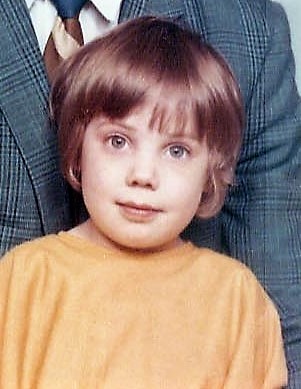

Losing our fourth son
On July 4, 1975, our fourth son, Barry Joseph, was born some three and a half months prematurely. Virginia had suffered a placental abruption and had been confined to bed for the previous month. With eight other children ages ten and under, it was almost impossible for Virginia to stay down and still meet the needs of the other children, even with such help as I was able to provide. On two occasions the unborn baby had been spared as a direct result of priesthood blessings, when by all signs he should have been lost. Seemingly he was to be preserved until he could live at least briefly and we could have the assurance rather than the mere hope that he could be ours eternally.
When Barry was finally born, he was too underdeveloped to survive long, and the hospital staff initially thought he was born dead. An hour or so later, Virginia asked if they would mind weighing the presumably dead fetus. When they did so, they discovered he was breathing. As it was a hospital in Provo, Utah, with a predominantly LDS staff and clientele, they asked me if I would like to give our son a name and a priesthood blessing, cautioning me that there was no way he would be able to survive long term. I was grateful to be able to do so, with the assistance of an intern. The spiritual experiences related to all of this were threefold:
- It was something of a miracle that Barry lived as long as he did inside Virginia so that he could be born alive.
- It was a blessing that he was belatedly discovered to be alive and that I was able to give him a blessing in the hospital.
- And finally, Virginia later wrote: “A couple of days after Barry was born and died I had the overwhelming impression he had voluntarily given up his mortal experience to make it possible for me to care for his siblings.” We are grateful to know he is waiting for us, and we look forward to getting to know him better in a coming day.

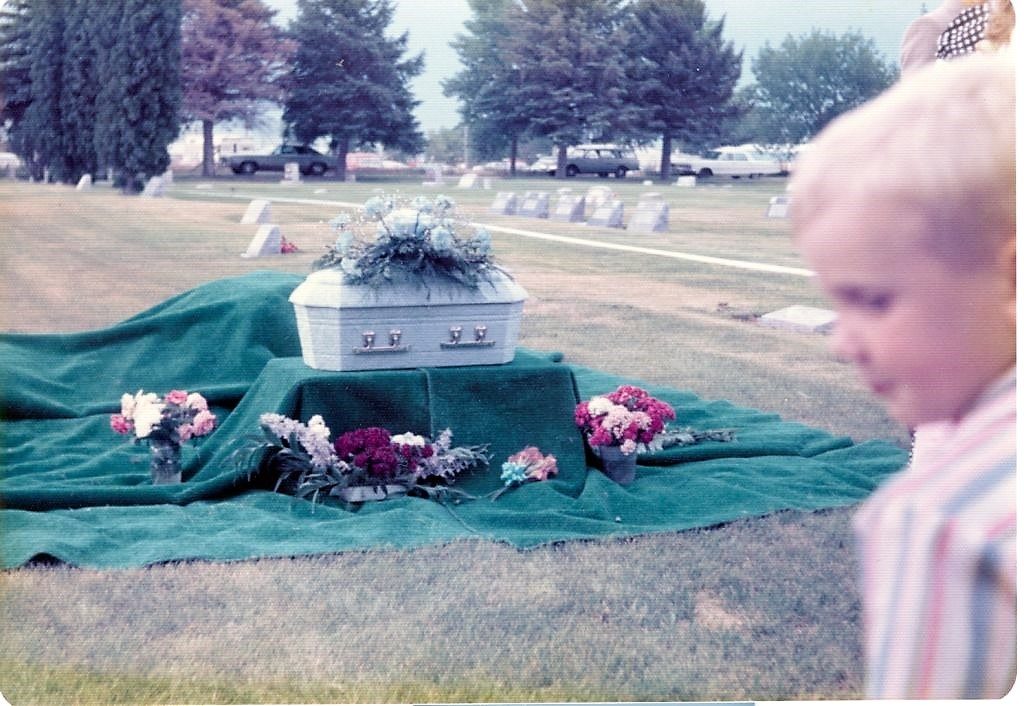
Two experiences with President Spencer W. Kimball
On September 3, 1976, in my capacity as a high councilor, I was invited to attend a nearly three-and-a-half-hour solemn assembly for priesthood leaders in the Interstake Center adjacent to the Oakland Temple. President Kimball and his two counselors as well as other general authorities were present. The meeting itself was unforgettable. But so was the experience I had prior to it as I walked uphill from the lower parking lot to the meeting. As I looked up, there just a few yards front of me crossed the entire First Presidency. As I recall, President Kimball waved at me. I felt a strong impression that there walked the three most important men on earth.
On March 28, 1979 (coincidentally President Kimball’s birthday), we were privileged to hear the president of the Reorganized LDS Church, Wallace Smith, speak. A week later we heard President Kimball in our own general conference. No doubt Wallace Smith was a good Christian gentleman. But the contrast between his talk and President Kimball’s was stark. Smith’s talk was very flat, with no punch or spiritual power behind it. He mainly talked about political and social issues, expressing concern about population, downplaying theology, and actually saying very little. He seemed uncomfortable and unsure of himself in his role as a “prophet.” Phrases such as “I believe there is hope…,” “cautious optimism…,” and “I don’t believe that He has [given up on the world]” characterized his presentation. He ended without expressing his testimony and without even an “amen.” He was absolutely wishy-washy on topics such as the restoration and the building of Zion.
It was so refreshing, by contrast, to hear President Spencer W. Kimball say on Saturday, “This is the word of God, which supersedes all other opinions.” We could sense what the scriptures meant when they said the Savior spoke as one having authority, and not as the scribes. We learned that His prophet spoke the same way.
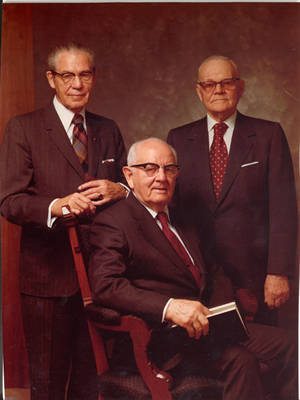

Impressions in the Holy Land
In June, 1977, Virginia and I were privileged to go to the Holy Land for three weeks with a Church Educational System group. It was a great experience, but possibly even better in the planning and reminiscing than in physically being there. Though we were in the land where the Savior spent His mortal ministry, I had the impression, as was written on the door of the Garden Tomb, that “He is not here.” I was grateful to remember that He had been seen in New York and in Salt Lake City since he had been last seen in Israel. I later reflected that I felt a greater nearness to the Savior as I read the New Testament than I had felt as I had geographically been in the same place He had once been.
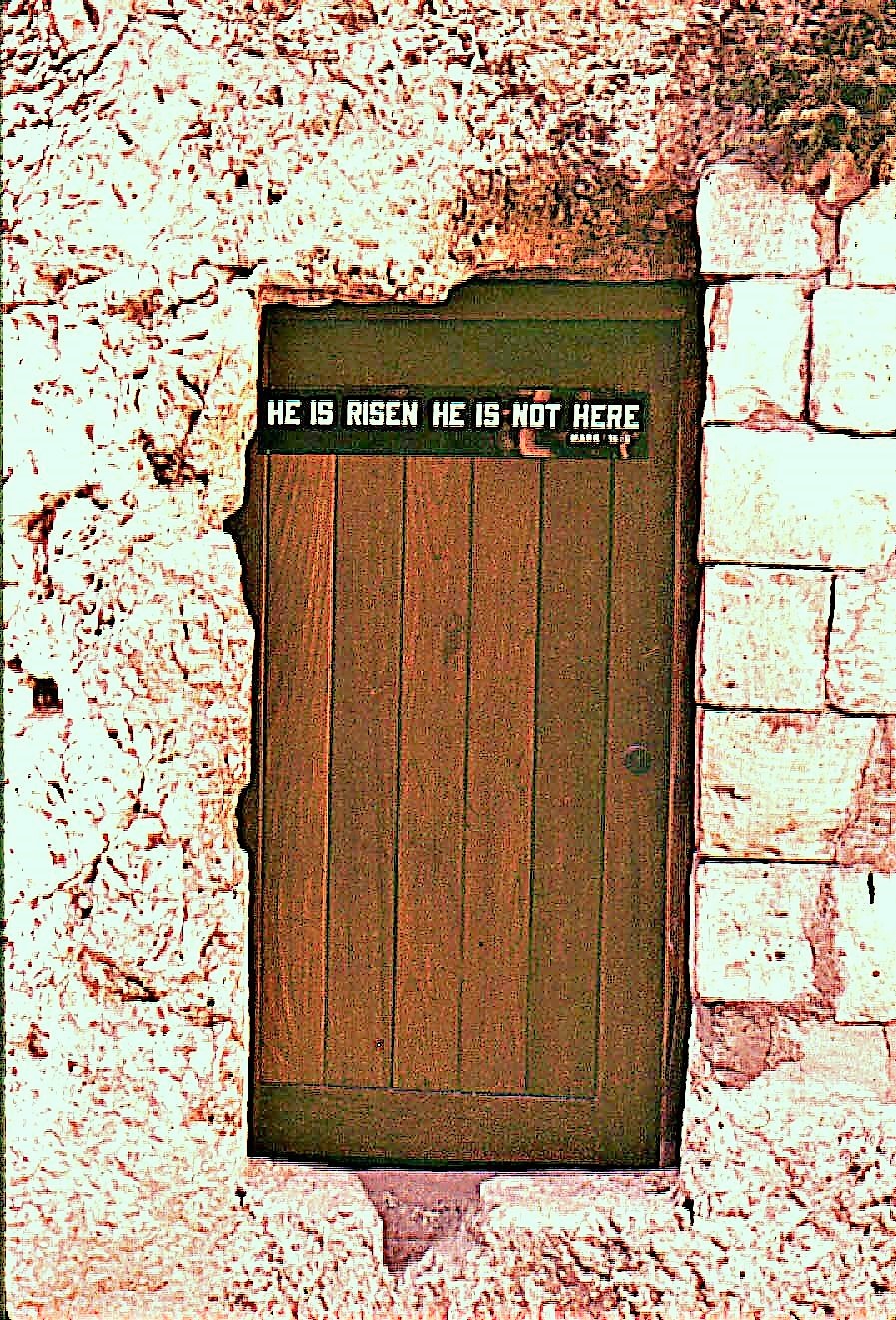

Conclusion
These were certainly not the only spiritual experiences we had over a twenty-year period. There were many other less recorded and perhaps less spectacular instances of divine protection, of mini-miracles which helped things turn out right, and of promptings which resulted in much-appreciated blessings. We regret not having recorded some of them in greater detail, so they could now be shared. But I hope the foregoing at least serve to illustrate our testimony that God is still a God of miracles today, that He loves His children, and is willing to bless them in times of great need. Even in times of less critical need His assistance has been much appreciated. Part three of this series, detailing later experiences, will follow in due time.


